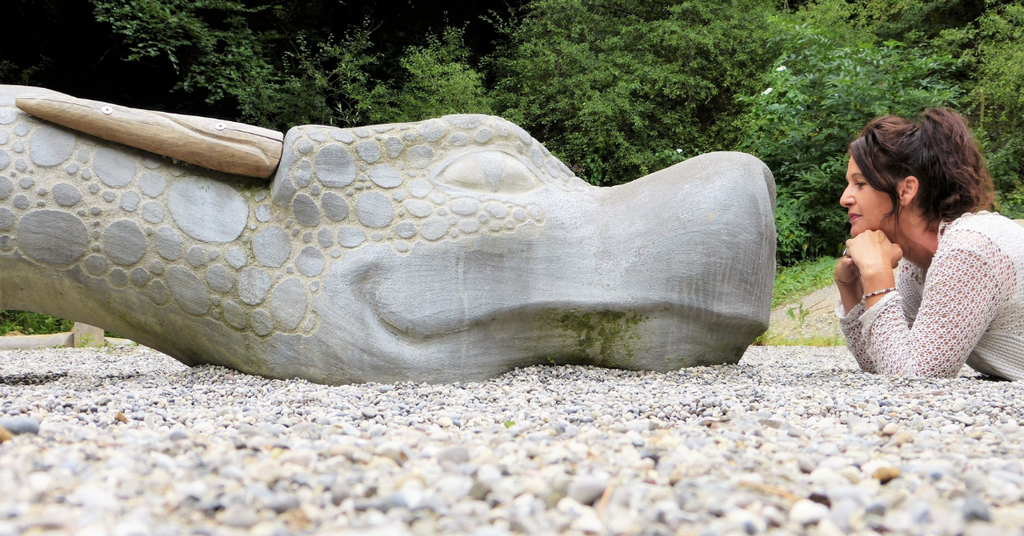The Good News About Depression & Sex

Would it surprise you to know that one out of every six adults will experience depression at some point? I’m not talking about feeling blue like we all do from time to time. I’m talking about clinical depression. The annual number of Americans with this particular affliction is close to 18 million (it’s 300 million worldwide) – and the numbers are growing. Further, those who experience a first episode have a 50% chance of suffering a second episode, 35% do not seek treatment and women face twice the risk that men do when it comes to developing depression.
What Depression Is
Depression is a complex condition that can impact the body in significant ways including the immune system, sleep, appetite and sexual function. Headaches, digestive disorders and chronic pain can also walk hand in hand with depression. Symptoms vary from person to person, but always include some or all of the following:
- Feeling down most of the time (sad, empty, hopeless)
- Markedly diminished interest or pleasure in all or almost all activities
- Significant weight loss or weight gain
- Difficulty with sleep (too much or too little)
- A noticeable slowdown of thought and inactivity (like days on the couch or in bed)
- Fatigue or noticeable loss of energy
- Feelings of worthlessness, guilt and/or shame
- Loss of concentration – feeling distracted and indecisive
- Recurrent thoughts of death
This list of symptoms is what doctors use to diagnose major depressive disorder (MDD). A positive diagnosis results when a person suffers from at least five symptoms for two weeks or more.
It's important to note that research conducted using brain-imaging technologies have found that the brains of people with depression actually look different. Specifically, the parts of the brain responsible for regulating mood, thinking, sleep, appetite and behavior appear to function abnormally. It is not known if the changes to the brain are caused by or are the result of depression.

What Depression Is Not
Depression is not a condition that means you’re mentally weak. It is not something to be simply wished away or powered through. And, oftentimes, it is not an illness that can be successfully navigated without help. No one that I know would dream of suggesting that someone with a broken bone or an ulcer or any other obvious physical issue go it alone in a mind-over-matter kind of way. The truth is that mental illness is no different, yet there is still a school of thought that people should combat depression with mental strength - just tough it out and get over it. And there is still a stigma attached resulting in a whole lot of misinformation about causes, symptoms and treatment. Worse yet, the stigma can exacerbate the tendency for depressed people to turn inward and self-isolate – and to avoid treatment.

Cause & Affect
Like its symptoms, the cause of depression varies. Genetics can play a part. In fact, people with a close relative (mother, father, sibling) with depression are two to three times more likely to have a tendency to develop the illness. Traumatic events from childhood like abuse and neglect or environmental stressors like death and divorce can also trigger depression. Other causes include certain medical conditions like underactive thyroid and chronic pain; medications such as sedatives and blood pressure pills; and hormonal changes from childbirth, perimenopause and menopause. Ongoing research suggests that there may even be a link between depression and gut health.

What About Sex?
Simply put, the chemicals in our brain that are associated with sexual desire react when other chemicals are impacted by depression. This is true with treated and untreated depression. In fact, about 45% of untreated depression sufferers experience some form of sexual dysfunction. The percentage is higher when medication is involved – approximately 63%.
More often than not, sexuality is interrupted by depression. Libido can be decreased or nonexistent due, in part, to the disinterest in pleasure that often accompanies depression. Medication can also play a role. Anorgasmia (difficulty achieving orgasm) can result when the brain’s chemicals are out of whack. And the physical signs of arousal can also change when depression is at play. Specifically, lack of vaginal lubrication in women and erectile dysfunction in men. These symptoms often lead to embarrassment and shame, not to mention confusion for the unafflicted partner.

It’s Complicated
Researchers have discovered that people generally fall into one of two categories when it comes to depression: internalizers and externalizers. Those who internalize look inward and withdraw socially while externalizers look outward for distraction and relief from emotional pain. This can actually result in risky sexual behavior or using substances to self-medicate - or both. The bottom line is that depression can and does result in both hypo- and hypersexuality.

The Good News
Even severe cases of depression are highly treatable. Many studies show that cognitive behavioral therapy focused on negative thought patterns and rumination are the most effective treatment for depression. Other studies indicate that therapy together with medication and lifestyle changes are the gold standard. In reality, treatment should be as individualized as its causes and symptoms.
"Depression can be seen as a kind of cave, and it takes some
time and effort to get out of the cave. But it is possible, usually
by learning some new patterns of thinking and doing."
-- Psychology Today
Let's take a closer look at some of the tools used to navigate out of the cave.
This type of therapy addresses negative thought patterns and can be effective with or without medication. The ultimate goal here is to give you the tools you need to combat the kind of thinking that happens with depression. A good therapist can help you stop the cycle of thought that keeps you in the cave.
Prescription medication for depression can be a touchy subject, because of the stigma that surrounds mental illness and for how it can affect sexual desire, orgasm and body weight. But it's important to note that not all anti-depressants are created equally in this regard. In fact, there are medications that do not have the downsides that we often associate with antidepressant medication.
Meditation can also be effective - on its own or in combination with cognitive behavioral therapy. The goal here is to diminish the psychological impact of distressing experiences and to stop negative thoughts from ruminating before they take hold and start a downward spiral.
Treating depression does not always require medical intervention. Sometimes, especially in cases with mild to moderate symptoms, a natural approach can be effective. This approach can include diet with an emphasis on anti-inflammatory foods; movement like walking, dancing and lifting weights; adequate sleep and meditation.

The Really Good News
Sex in and of itself has multiple mental health benefits. For one thing, dopamine, endorphins and oxytocin (the feel-good chemicals) are released during sex and that can provide at least a temporary relief from symptoms. Sex is also a physical activity - yes, you can count it - and physical activity is known to relieve symptoms of depression and anxiety. Even your post-coital beauty sleep is enhanced when yet another chemical, prolactin, is released during orgasm.
Research suggests that the more adventurous the sex the better, when it comes to well-being and, in case you were wondering, you get the same benefits from masturbation that you do from sex with a partner.
But am I suggesting that we add sex to our arsenal of depression-busting tools? Yes, yes I am. So, here are some strategies to help with the kind of "therapy" that happens between the sheets.
- Stay focused on overall health - keep it moving and eat healthy, whole foods as part of a balanced diet
- Communication between partners is always key in our sexual relationships. The same holds true when one partner is dealing with depression. When one partner opens up about symptoms, it may well answer some puzzling questions for the other. It also may pave the way for both partners to navigate the challenges together.
- Talk about what's happening in your sex life with a therapist and you might be surprised at how helpful it can be, once you get over the natural tendency to be tight-lipped about the bedroom.
- Some sex therapists specialize in sexual dysfunction and are experienced at helping people work through problems. Why not consult with a sex expert when the issue is sex?
- Any changes to medication must be discussed first with the prescribing physician -- but there are some possible changes to discuss. Ideas for easing side effects include trying a lower dose and/or taking meds at a different time of the day (like after sex instead of before). There are also some medications that are known for counteracting sexual side effects.
- Or maybe change medications altogether. Your doctor can tell you about some of the newer anti-depressants that don't have sexual side effects.

Fortunately, sexual dysfunction is not the end of the story when it's caused by depression. There is help out there and good reason to be hopeful. Depression is a serious matter, but the earlier it's treated, the better chance of avoiding recurring episodes and the more quickly symptoms can be resolved.
May is Mental Health Awareness Month, but I can think of about 18 million reasons why mental health awareness should be 365 days a year.
Looking for a therapist? Here's a couple of links to help you find one:
This article by VeryWellMind has a lot of good
information on treating depression with self-care.
11 Ways to Treat Depression Without Medication
If you need help for yourself or someone else, please contact the
National Suicide Prevention Lifeline at 1-800-273-TALK (8255).
Sources:
Cleveland Clinic Online, Depression and Sex, December 11, 2020
PSYCOM, The Therapist Is In: Burn Out in the Bedroom, Sherry Amatenstein, LCSW, January 23, 2020
Health Central, Let’s Talk About Depression, by Meirav Devash (wellness writer), Farah Fazel, M.A., Psy.S., LP, NCSP (medical reviewer), January 6, 2020
Psychology Today, The Complex Link Between Depression and Sex, Justin J. Lehmiller, Ph.D., April 7, 2021
Psychology Today Blog, What Is Depression?, Psychology Today Staff, Current
Psycholgy Today Blog, Natural Approaches to Depression, Psychology Today Staff, Current
Talkspace, Mental Health In Bed: Sex and Depression, Ashley Laderer, November 1, 2017
Talkspace, 6 Ways Sex is Good for Your Health, Ashley Laderer, clinically reviewed by Jill E. Daino, LCSW-R, February 7, 2018


Leave a comment